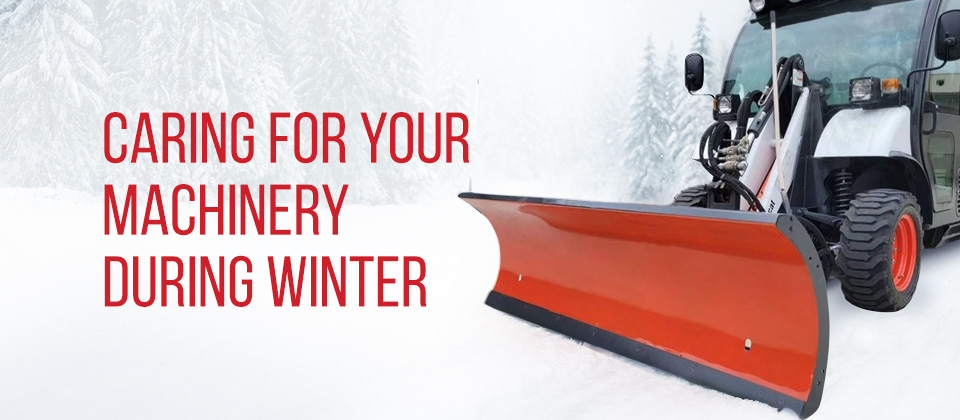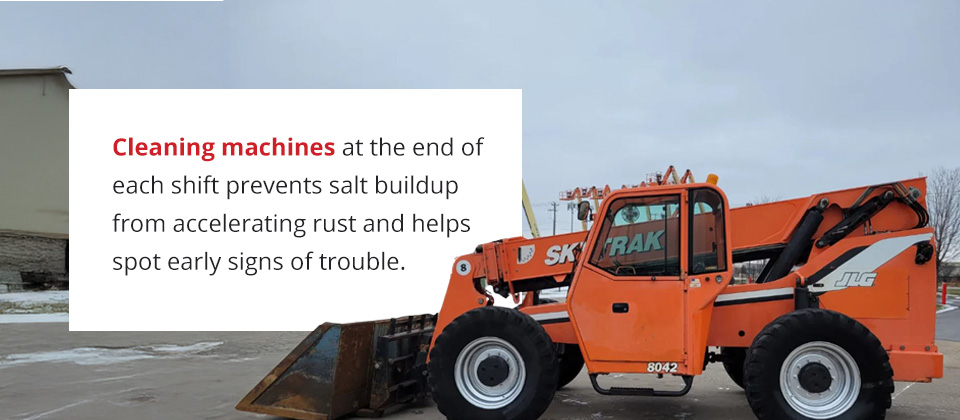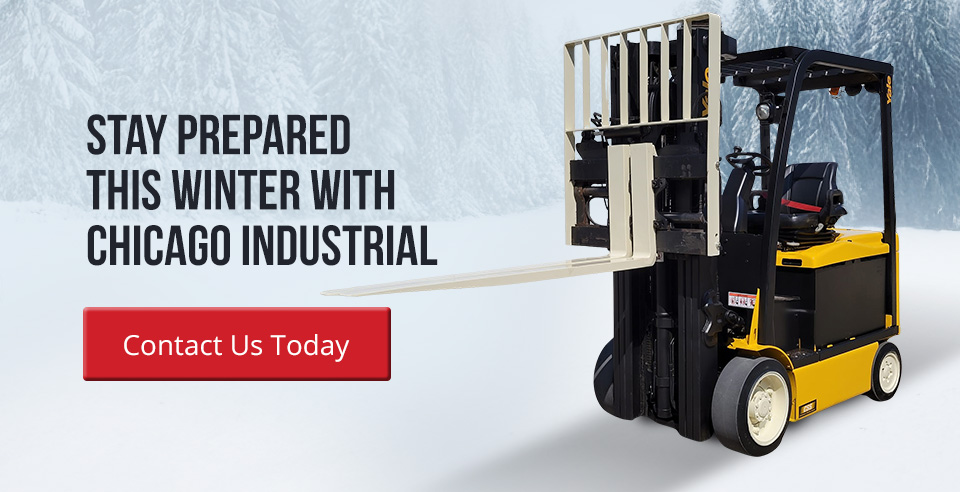Caring for Your Machinery During Winter
Cold weather introduces various mechanical, operational and safety challenges that can shorten equipment lifespan, reduce productivity, increase repair costs and even endanger lives. A proactive maintenance approach is essential for heavy equipment owners and operators in the northern states, where snow, freezing rain and sub-zero temperatures are common in the winter.
9 Tips for Caring for Industrial Equipment During Winter
Whether you’re managing scissor lifts, forklifts, telehandlers or other essential equipment, understanding seasonal stressors and adjusting your routine accordingly can make the difference between smooth operation and costly downtime. Follow these practical, field-tested winter care tips for heavy equipment:
1. Consult the Manual
Every machine has quirks, so general advice may not apply to all makes and models. Before performing any industrial equipment care, always refer to the manufacturer’s manual. These handbooks often outline your machinery’s requirements, including maintenance schedules and cold-weather operation guidelines such as the correct fluids, battery handling procedures, operating temperatures and recommended startup practices. Following these instructions enhances safety and reduces the risks of premature wear or technical issues throughout the season.
2. Warm up Your Engine
Cold engines are inefficient, slow to respond and prone to internal damage. Starting an engine and going straight to work will strain the system in freezing conditions. One of the most effective ways of maintaining industrial equipment is letting the engine idle for 10-15 minutes before use. It gives critical components time to reach optimal operating temperature and allows lubricants to flow evenly throughout the system.
In extreme cold, idling the engine may not be enough. Using a block heater can make warmups more effective and reduce long-term engine wear, especially when you park outdoors.
3. Use Winter Fuel, Coolant and Other Fluids
Fuel gelling and frozen coolant lines are common culprits behind equipment breakdowns in winter. Switch to seasonally appropriate diesel blends — typically No. 1 diesel — which offers lower viscosity and better cold-weather performance. Standard No. 2 diesel often gels in sub-zero conditions unless you use additives. Likewise, you should switch to winter-rated coolant formulas to prevent freezing.
Cold temperatures also impact the flow and performance of hydraulic and brake fluids, engine oil and grease. We recommend using winter-grade formulations across all systems for optimal equipment performance.
4. Let Hydraulics Warm up Slowly
Idling your engine doesn’t warm hydraulic systems. During cold weather, hydraulic fluid thickens, making it difficult for the system to function properly. This can weaken seals, cylinders and valves. To avoid potential damage, warm up the hydraulics slowly by gradually moving the forks or lifting mechanism through their full range of motion. A steady warmup allows the hydraulic fluid to reach optimal operating consistency and ensures smooth motion.
5. Store Equipment Properly
When not in use, store machinery in covered or climate-controlled environments. Exposure to sleet and snow can freeze moving components, corrode metal parts and damage electronics. If indoor storage is unavailable, insulated covers and block heaters can help mitigate exposure. Storing equipment raised off the ground, such as on pallets, timbers or similar platforms, will also reduce the risk of freezing to the ground.
6. Grit Workspaces
Operating heavy machinery on slippery ground is a recipe for disaster. Applying a layer of grit or sand to outdoor work areas improves traction and minimizes the risk of equipment slipping or getting stuck.
7. Clean Your Equipment
Snow, salt and slush can hide wear, corrode surfaces and affect performance. Cleaning machines at the end of each shift prevents salt buildup from accelerating rust and helps spot early signs of trouble. Pay special attention to undercarriages, tracks and hydraulic joints. For tracked equipment, removing frozen debris can prevent lock-ups that damage pins and rollers.
8. Move Stored Equipment Periodically
It is unwise to leave equipment immobile for the entire season. Periodically switch on and move your heavy machinery briefly to activate and lubricate the drivetrain, hydraulics and steering systems.
9. Take Proper Battery Care in Electric Equipment
Batteries are one of the most vulnerable components during the cold season. Low temperatures can reduce charge retention, increase discharge rates and slow recharge cycles. Before winter hits, inspect terminals for corrosion, test voltage and apply dielectric grease to prevent moisture and corrosion buildup.
For electric equipment such as boom lifts, scissor lifts and forklifts, care during winter is even more critical. Cold weather can cut battery run time significantly, disrupting workflow and forcing more frequent charging cycles. Use battery blankets or heated storage when possible. Keep terminals clean and dry, and avoid charging frozen batteries until they reach at least 40° F.
Winter Care for Heavy Equipment Checklist
Preventive maintenance is most effective when it’s consistent. Here is a preventive maintenance checklist you can adopt to monitor and maintain the integrity of your machinery throughout winter:
- Inspect filters: Regularly check air, fuel and hydraulic filters for contamination or blockages that could hinder performance.
- Examine hoses, seals and fluids: Look for signs of wear, leaks or thickened fluids and ensure correct fluid levels.
- Check tire condition and pressure: Tire pressure often drops in the winter, impacting stability and performance. Ensure all tires are properly inflated and check for cracks or other signs of damage.
- Clean the lights and wipers: Visibility is crucial during shorter winter days. Ensure all lights function correctly and wipers are free of dirt or snow buildup.
- Assess the heater and defroster: Verify that the heating system clears frost and condensation promptly to keep the operator cabin comfortable.
- Lubricate moving components: Regularly apply appropriate lubricants to joints, bearings and other moving parts.
Recommendations for Operator Safety in Winter
Here are some safety recommendations for operators working in cold, snowy or icy conditions.
Proper Training
Providing thorough training on cold weather hazards and appropriate response strategies is critical. Instruction should cover recognizing the early signs of cold stress, proper equipment startup procedures and handling unexpected mechanical issues.
Comprehensive Engineering Controls
Implement engineering controls to help reduce the effects of freezing temperatures on equipment and personnel. For instance, you may:
- Use radiant heaters to protect workers from extreme cold.
- Install wind barriers and adjust workplace layouts to minimize cold spots and exposure to gusting winds.
- Set up well-lit zones to improve visibility during operations.
Appropriate Dressing
Proper attire helps prevent cold stress and injuries related to exposure. Encourage workers to dress in multiple layers of clothing for better insulation. Operators should also wear insulated steel-toe boots, gloves and hats to keep extremities warm. Note that appropriate clothing should protect against cold while allowing comfortable movement around heavy machinery.
Safe Work Practices
Adopt clear protocols and scheduling practices that prioritize safety in extreme winter conditions:
- Slow down: Reduced speed helps maintain control and response time on slick or uneven surfaces.
- Take frequent breaks: Regular rest periods in a warm environment allow workers to warm up and reduce fatigue that might lead to accidents.
- Avoid working under poor visibility: Adjust work schedules or pause operations if weather conditions significantly impair visibility.
- Proactive scheduling: Organize tasks during the warmest parts of the day when possible.
- Monitor for cold stress: Keep an eye on the physical and mental signs of cold stress among employees to address issues before they escalate.
- Establish proper communication: Maintain clear communication channels for alerts regarding sudden weather changes or emergency evacuation procedures on remote sites.
Stay Prepared This Winter With Chicago Industrial
Cold weather can have a huge impact on your operations. However, with the right maintenance plan and seasonal adjustments, your machinery can perform effectively and your operators can stay safe. If you’re looking for top-tier heavy machinery for sale or rent or need guidance on heavy machinery care, Chicago Industrial is ready to help. We offer an extensive selection of used and new industrial equipment that provide reliable performance year-round. Explore our inventory or contact us today to speak to one of our experts.




